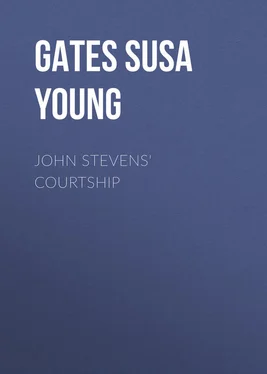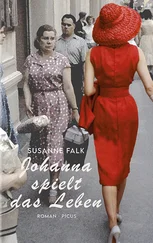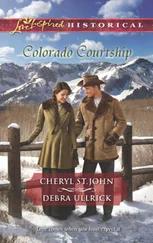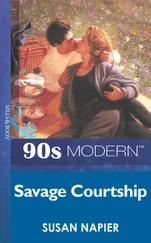Susa Gates - John Stevens' Courtship
Здесь есть возможность читать онлайн «Susa Gates - John Stevens' Courtship» — ознакомительный отрывок электронной книги совершенно бесплатно, а после прочтения отрывка купить полную версию. В некоторых случаях можно слушать аудио, скачать через торрент в формате fb2 и присутствует краткое содержание. Издательство: Иностранный паблик, Жанр: foreign_antique, foreign_prose, на английском языке. Описание произведения, (предисловие) а так же отзывы посетителей доступны на портале библиотеки ЛибКат.
- Название:John Stevens' Courtship
- Автор:
- Издательство:Иностранный паблик
- Жанр:
- Год:неизвестен
- ISBN:нет данных
- Рейтинг книги:3 / 5. Голосов: 1
-
Избранное:Добавить в избранное
- Отзывы:
-
Ваша оценка:
- 60
- 1
- 2
- 3
- 4
- 5
John Stevens' Courtship: краткое содержание, описание и аннотация
Предлагаем к чтению аннотацию, описание, краткое содержание или предисловие (зависит от того, что написал сам автор книги «John Stevens' Courtship»). Если вы не нашли необходимую информацию о книге — напишите в комментариях, мы постараемся отыскать её.
John Stevens' Courtship — читать онлайн ознакомительный отрывок
Ниже представлен текст книги, разбитый по страницам. Система сохранения места последней прочитанной страницы, позволяет с удобством читать онлайн бесплатно книгу «John Stevens' Courtship», без необходимости каждый раз заново искать на чём Вы остановились. Поставьте закладку, и сможете в любой момент перейти на страницу, на которой закончили чтение.
Интервал:
Закладка:
Susa Young Gates
John Stevens' Courtship / A Story of the Echo Canyon War
PREFACE
A story of love, in the rugged setting of pioneer days, is the theme of this book. The characters of the story move among the stirring incidents of the Echo Canyon War – an affair absolutely unique in the history of the land. The scenes and events depict faithfully the conditions that, according to the historians – Tullidge, Whitney and Bancroft – prevailed in and about the Territory of Utah during the period of the "War." Much information has also been gathered from Vol. II of the Contributor and from numerous pioneers who recall vividly the intensity of feeling that characterized the days of "Johnston's Army" and "the Move." The characters of the story are, of course, mainly fictitious and have had an existence only in the author's mind. John Stevens is a composite; his outer appearance was faintly suggested by an obscure character of pioneer days; many pioneers knew and will recognize Aunt Clara; Diantha was modeled after a woman yet living in the prime of her life.
Young people often think that romance and thrilling episodes, for which youth hungers, are not found within daily life; and frequently go to perilous lengths in search for that which in fact is right at home. An avowed purpose of this book is to show that there is plenty of romance and color in every-day life – if the eye be not life-colorblind. If, therefore, John Stevens, with his big, generous heart can awaken the soul of one youth to a higher courage, a more manly outlook upon the splendidly hard discipline of pioneer Western life; if Diantha's suffering and sweet Ellen's sad death help just one vacillating girl to a realization of the dangers with which the path of love and youth are always strewn, then indeed will the author be satisfied. The last two chapters were written at the solicitation of Diantha herself. She begged that the "girls" might be made to see how sweet and enthralling true, pure and sanctified married affection can be.
It is fitting that acknowledgment be here made of the careful and helpful service rendered by the many friends who have read, re-read, suggested, corrected, approved, criticized and molded "John Stevens" into a somewhat passable shape. To these friends, grateful thanks.
The pioneer days were days of beauty and rich emotions. That their memory should be perpetuated is the author's chief justification for the writing of this book.
SUSA YOUNG GATES. Salt Lake City, July 24, 1909.
I
THE PIC-NIC IN THE WASATCH
"Dianthy, how are you going up the canyon? Are you going with me and your brother?"
"No, I think not, Rachel. I promised to go with John Stevens. And the very next day Henry Boyle asked me to go with him; wasn't that a shame?"
"Wasn't what a shame? That Henry should have the impudence to ask you to go with him? I should think he'd find out after awhile that you are not in love with him and never will be."
"I'm sure I can't tell how you know so much about me and my affairs, Rachel. I haven't told any one I am or I am not in love with Henry Boyle. And I can't see how it is that you have such a prejudice against Henry. I'm sure you can't find any fault with him. He's a perfect gentleman – far more civilized and polite than a whole town full of men like – like – well – like many of our Utah boys. And he's ambitious, too; wants to make something of himself; which is more than some of our boys do. Just see how he came here from England two years ago; left his home and all his relatives, and in less than a year worked up till he got the position of clerk in Livingston and Kincaid's store."
"Exactly! And now he is a gentleman in very deed, for he wears store clothes every day in the week, and the finest worked ladies' buckskin gloves on Sunday. What more does he require to be a gentleman?"
"See here, Rachel, I want you to answer me one question. Do you, or does my brother Appleton, know anything wrong about Henry Boyle? Isn't he a 'Mormon,' in good standing and repute? Doesn't he pay his tithes and donations, and attend his meetings regularly? What more can you ask?"
"Oh, Dian, you wear me out completely. Stick to your 'Enery, if you want to; but he'll never amount to a row of pins. He's a real namby-pamby man; and that is about all he is likely to be. I should think you'd want a being with some life and spirit."
"Like John Stevens, perhaps. Well, I've never seen any evidence of this wonderful life and spirit you folks are always talking about, in John Stevens. The only fiery thing about John, that I've ever discovered, is his red beard."
With a half sarcastic smile, the girl dusted the last speck of flour from her cotton apron, went to the wash bench and calmly washed the flour and tiny bits of dough from her hands; then, drawing a clean cloth over her wooden bread trough, she set it on the kitchen table for the night.
Rachel Winthrop sighed as she watched these proceedings and hushed her baby to sleep, in the small, yet comfortable rush-bottomed rocker, which was such a luxury in early Utah days. She admired and loved her husband's youngest sister, with all the strength of her affectionate soul; and she yearned with the tenderness of a mother over that indifferent, self-centered, yet handsome and sensible young person.
"I don't wonder that men admire you, Dianthy," she said, at last. "You're a fine looking girl."
"You mean I've pretty good taste in fixing myself up. People wouldn't admire me so much if they saw me 'off parade' a few times. It's my clothes and the way I put them on that wakens admiration, Rachel. Just look at my nose!"
She stood a moment, with her arms akimbo, her face tilted as she tried to squint with half-closed eyes down at the offending organ.
"There's nothing the matter with your nose, Dianthy, only it's got a patch of flour on the side of it just now. But come, I must put baby to bed, so we can finish up, or we'll never be ready to start in the morning."
It was the evening of the 21st of July, 1857. All Salt Lake was astir with preparations for the famous outing to Big Cottonwood Canyon, where the Twenty-fourth – Pioneer day – was to be spent. Candles sputtered and burned down, were snuffed and finally replaced with new ones, as the women of the young city worked hard yet happily the night through, baking great banks of pies and loaves upon loaves of tender, yellow cakes; cooking beef, lamb and chickens; roasting young pigs before the open fire, in the brick ovens, or in one of the few step-stoves. Serviceberry preserves, and plenty of thick amber-colored molasses were stored in all the pails and jars obtainable. Such creamy-brown loaves of yeast or "salt-rising" bread; such pots of sweet, yellow butter; such crisp doughnuts and delicate "dutch cheese," never before had been seen in such profusion during the brief ten years' history of the Great Salt Lake Valley.
As Rachel Winthrop laid the child in its cradle and prepared to finish her ironing of print dresses and blue chambrey sunbonnets, the young girl, who had pulled down her sleeves and adjusted her collar, went slowly out at the front door, as if watching for someone. Then, turning back into the sitting-room, she seated herself at the small melodeon in the corner, and began to play softly. Her touch upon the tiny ivory keys was very sympathetic and musical. Waltzes and schottisches poured out in mellow harmony upon the heated waves of the July evening. Then, as if filled to the full with the spirit of music that she had invoked, she lifted up her voice in song. "Shells of the Ocean" and "Rock Me to Sleep, Mother," betrayed a quality of tenderness in the soul that the somewhat proud exterior did not warrant.
"Oh, Dian," called her sister-in-law, "why do you sing such mournful songs? You give me the creeps."
Читать дальшеИнтервал:
Закладка:
Похожие книги на «John Stevens' Courtship»
Представляем Вашему вниманию похожие книги на «John Stevens' Courtship» списком для выбора. Мы отобрали схожую по названию и смыслу литературу в надежде предоставить читателям больше вариантов отыскать новые, интересные, ещё непрочитанные произведения.
Обсуждение, отзывы о книге «John Stevens' Courtship» и просто собственные мнения читателей. Оставьте ваши комментарии, напишите, что Вы думаете о произведении, его смысле или главных героях. Укажите что конкретно понравилось, а что нет, и почему Вы так считаете.












